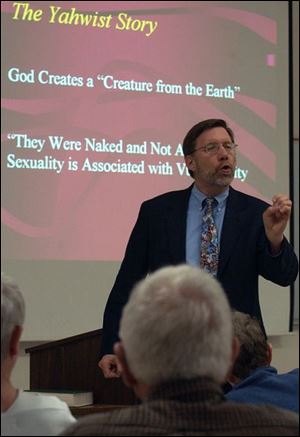
Spring lectures will delve into religion, politics
3/26/2005
Richard R. Gaillardetz says the church has something to offer to public conversation.
How much can religion and politics interact before constitutional lines are blurred? Does the First Amendment's call for separation of church and state imply that politicians should not let their faith influence their work?
Those are among the issues to be addressed by six speakers in the Corpus Christi University Parish 2005 Spring Lecture Series, which begins Tuesday.
"The question is: What is the appropriate way for religion to contribute to our political system?," said Richard R. Gaillardetz, the Murray/Bacik Professor of Catholic Studies at the University of Toledo.
"If you look at our most recent national elections in the fall, religion played a prominent role," he said. "Some celebrated that as a coming of age of a genuine 'public church,' while others complained, saying public discourse was coopted by the religious right."
Catholic intellectual tradition promotes "genuine church participation" in public life, he said, with the belief that the church has something to offer to public conversation yet respecting the church-state separation.
The Rev. James Bacik, theologian and pastor of Toledo's Corpus Christi Catholic Parish, will open the series with a lecture titled: "The Church and Politics: Guidance from John Courtney Murray."
Father Murray was a Jesuit priest and theologian who devoted much of his life to exploring the relationship between religion and society, Father Bacik said.
"He was the architect of the religious liberty document for Vatican II," Father Bacik said, "and so is often thought of as the most influential American Catholic theologian in history."
Father Murray, who was born in 1904 and died in 1967, referred to the First Amendment as "the articles of peace" and believed that separation of church and state allows religions to flourish in a pluralistic society, Father Bacik said.
His teachings were influential in the 1960 presidential election, when John F. Kennedy became the first Catholic president, and the priest was featured on the cover of Time magazine during that era.
"There is a lot of things that he held that are still valuable today," Father Bacik said, "including a great appreciation for the First Amendment, the notion that religious people should be involved in the political realm, and the idea that we had to have civil discourse - we had to be able to talk to one another and to argue constructively."
Professor Gaillardetz said his April 5 lecture will discuss "the public implications of Christian worship."
discuss "the public implications of Christian worship."
The Corpus Christi series will continue April 12 with Margaret O'Brien Steinfels, former editor of Commonweal Magazine, speaking on "Whatever Happened to Faithful Citizenship?"; April 19 with Monika Hellwig, president of the Association of Catholic Colleges and Universities, speaking on "Terms of Engagement: The Nature of the Redemption"; April 26 with Michael Himes, professor of theology at Boston College, and May 3 with John Allen, Jr., Vatican correspondent for the National Catholic Reporter and author of Conclave: The Politics, Personalities, and Process of the Next Papal Election.
Each of the six lectures in the Corpus Christi University Parish 2005 Spring Lecture Series begins at 5:30 p.m. Tuesdays in Corpus Christi University Parish, 2955 Dorr St. Tickets are $10 for individual lectures or $30 for the series. Information: 419-531-4992.
Contact David Yonke at:
dyonke@theblade.com or
419-724-6154.